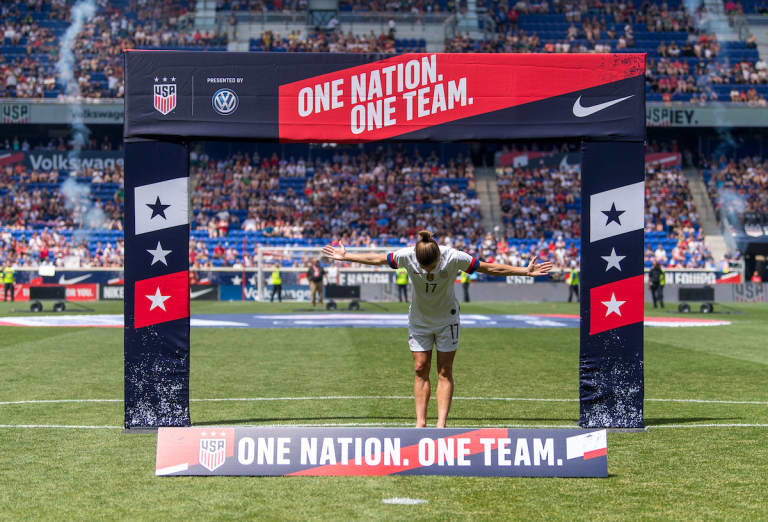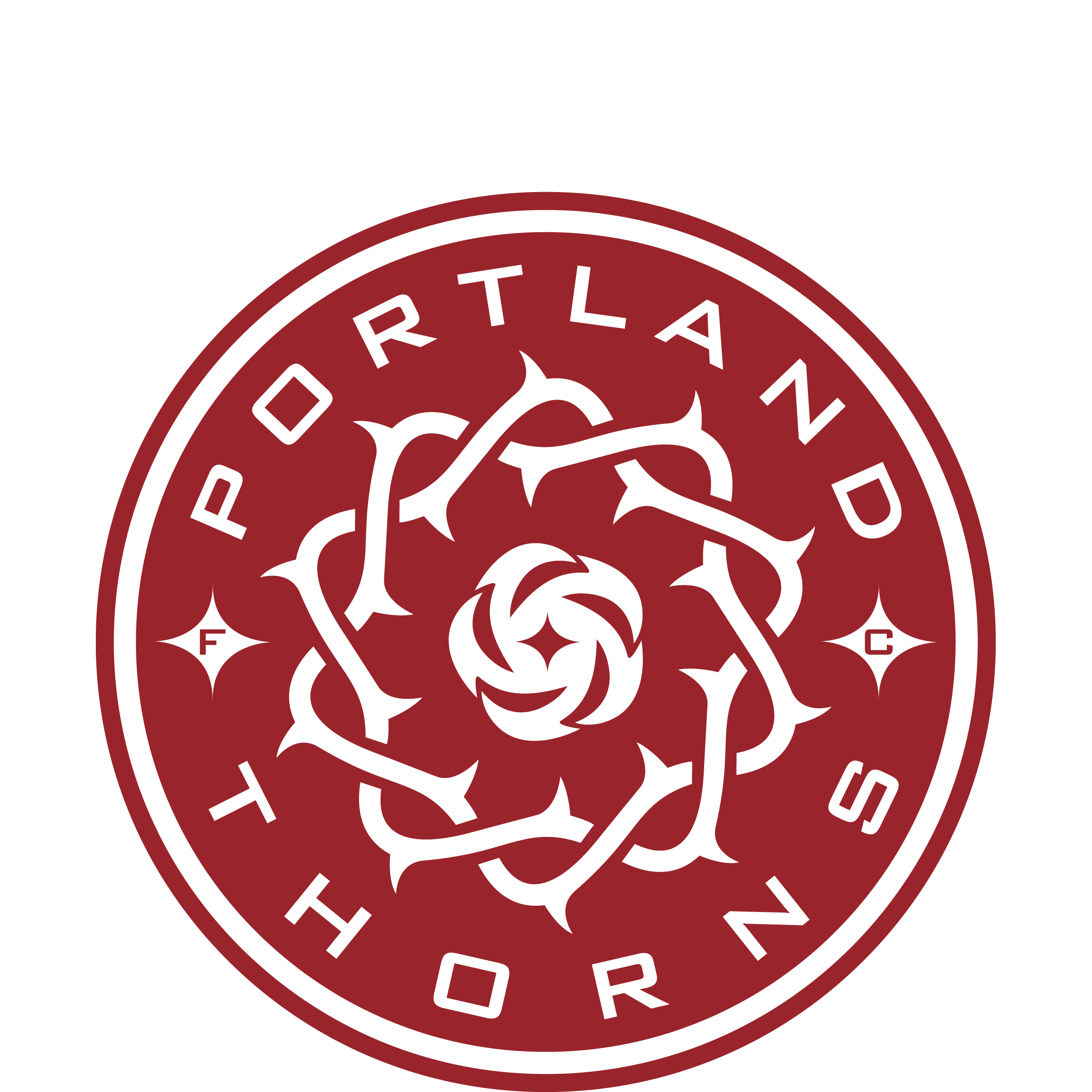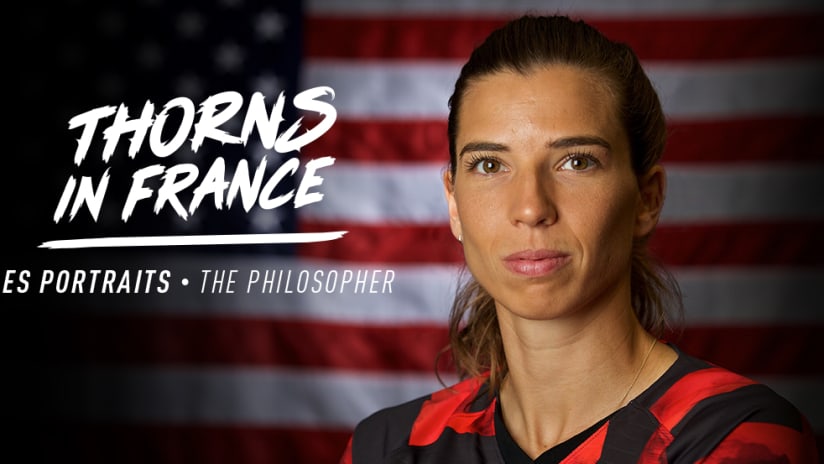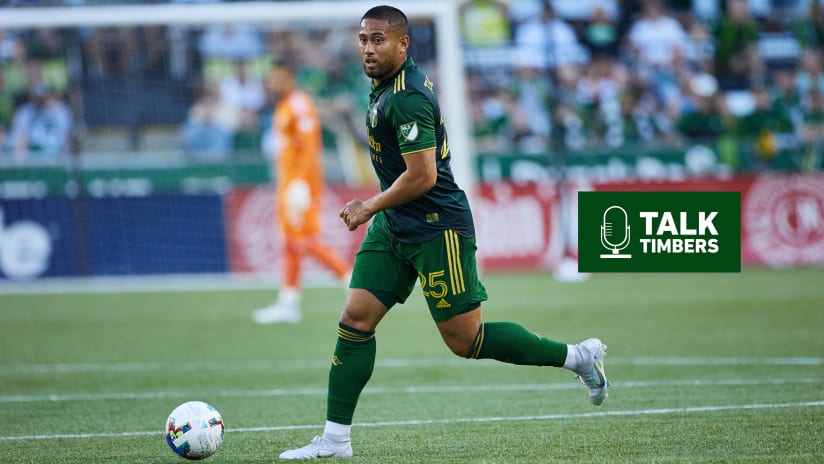PORTLAND, Ore. – You don’t get to 31 years old without developing some philosophy. The only question about that philosophy is, “How profound?” While some of us leave our 20s’ naiveté dispelling assumptions of the world, others used their third decade more wisely, sifting through errors of youth to reach a new chapter as something more mature.
For many who’ve followed her story, it would be difficult to think of Tobin Heath on those terms, mostly because few think of her in terms of a personal progression. Her talents have always been so distinct, so pronounced, that there’s a singularity to her image. Tobin Heath is skilled, Tobin Heath is technical, Tobin Heath is one of the most creative players in the world, they say – things that have been true ever since she was 18 years old.
“I know everybody sees it,” Portland Thorns FC captain Christine Sinclair says about her club teammate. “To be blessed to play with probably the most skilled female soccer player on the planet, to see her school world-class defenders, it’s this confidence that she has that makes me chuckle inside at how good she is … It’s an honor to be on the field with her, day in and day out.”
To define Heath by only her skills, though, would deny the most interesting part about her. On the brink of her third World Cup, the three-time national college champion, two-time gold medalist, one-time world champion and two-time league champion is much more than the 18-year-old being thrown into those challenges. Like any other person, she’s the sum of her experiences, with perspective that informs her particular 31-year-old philosophy. She’s a soccer player, first, but in the way she talks about the game, Heath is clearly much more.
“Football and happiness is a funny thing,” she says, sitting in the lower levels of Providence Park. It’s March, during Portland Thorns FC’s preseason media day, and we’re supposed to be talking about the coming season.
“People always think you win something, and those are the happiest times. And I've been fortunate to win pretty much everything. That’s not to say, ‘Oh, look what I did,’ but at no point has it ever been a finish line, for me. ‘Oh, now I did that. Now it's over.’ It's never over.”
Find an 18-year-old who says that with Heath’s conviction, and you’ve found a teenager reciting a script’s dialog. And those teenagers exist. That is, after all, what players are supposed to say. For Heath, though, it’s different, and not only because her responses come with the confidence of a career’s trial and error. The question she’s answering isn’t about football and happiness. It’s about remembering her happiest moments: a request to identify specific points in time. For Heath, though, points on a timeline seem less interesting than the confluence of ideas – the temporal and philosophical.
“When it comes to these special moments that I've had in my career and how that equates to happiness, in a way it's an illusion of happiness, because people think that so much of happiness is with success. But it's not. It's in every moment of every day you can find happiness.”
There’s a lesson that’s about to be given in this interview, one that goes beyond the coming season, World Cup, or the sport itself. It’s about how a prodigy has developed a philosophy around the game that she loves, one that’s allowed her to process success and attention while keeping her life in balance.
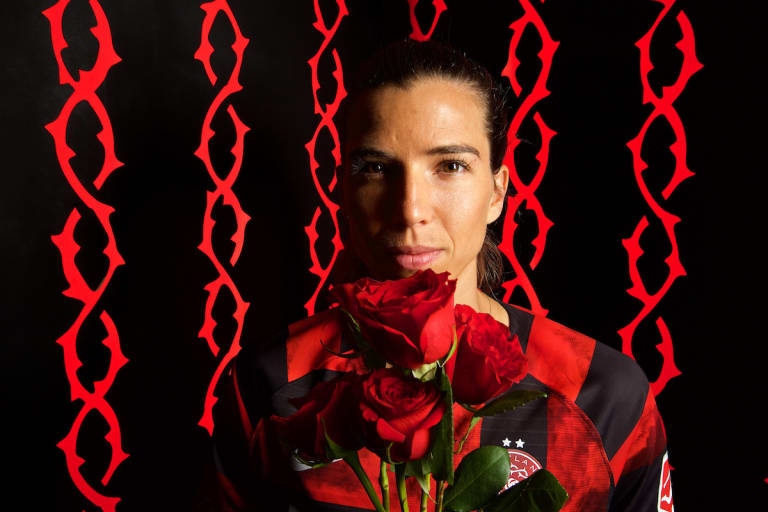
Image: Craig Mitchelldyer / Thorns FC
The Tao of Tobin goes beyond soccer and happiness, and touches on anything you might ask about her career, leaving you wondering if this is the way she’s chosen to face 13 years of redundant questions or if this the right side of an equation, one that’s evaluated the inputs of a career at the highest levels to produce a truth that’s slightly more succinct, if obscure.
Take her view on player development as an example. In it, there’s a personal perspective, and thoughts approaching a prescription. But it’s more of a Socratic process that anything definitive – an exploration of possibilities, with a sincere search for answers.
"I wonder if I had grown up in a different country – if I had grown up in Brazil – what player would I have been,” she asks early in our conversation, vaguely alluding to the freedoms she was granted as a youth. “What kind of things would they have encouraged out of me?
“I'm thankful that I grew up in the U.S. because, similar to education system, in the U.S. everything has to be well-rounded. You have to be good at everything in order to be considered good.”
Soccer wasn’t her sole focus growing up, but it was her love. She remembers playing a series of different sports around her local YMCA while growing up in New Jersey. The game was a choice; never a demand. She was able to trial and error to find out what she loved most about her sport.
“Sometimes the special quality of things gets lost,” she says, again jumping from the specifics of her to something more general. “That's what makes individual players good, it's what makes them special.
“I don't know in what way [U.S. soccer players] can continue to develop that, but I know for me, personally, what I love about the game are special players. So, I would want to find a way to get more of those, especially here in the U.S.”
This is where Heath’s philosophy starts to cross over with words we’ve heard from icons like Lionel Messi, or Ronaldinho – players who, when we think of what makes them special, distinguish themselves by their relationship with the sport’s most important part – the thing they have to know most.
“I was speaking about this idea of the ball the other day,” she remembers, “and how it's the beginning and the end of like everything.
“You start with a ball at your foot. That's all you have, and that kind of relationship is what continues to grow and evolve throughout your career. “
Again, it’s a point where the words could be coming from an 18-year-old, but with no credibility. Others can talk about the soccer ball being special, and how a unique relationship is required to reach the game’s highest levels. But few have ever been able to speak with a true sense of intimacy around those thoughts. They don’t know the hours spent trying to control the ball, to see how they unlock the type of player they can become.
It’s a relationship of success and failure; of both adoration and anger. And with Heath, that relationship is very real.
“In special moments – in the biggest games that you could ever think of – it comes down to that same relationship. It's just the ball at your foot. It's a beautiful love-hate relationship, where my whole life has been seen through that in a lot of ways. It's definitely my closest companion, at this point.”
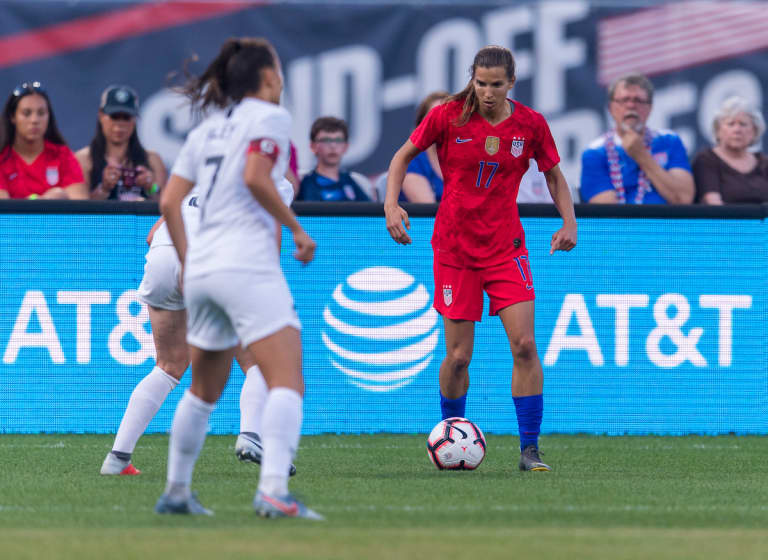
Image: ISI Photos
Those last three words hint at an evolution – a crucial part of Heath’s story. There are a myriad immutable qualities about her, from the smile that became trademarked the moment she broke into her national team to the hunch of her shoulders as she lines up a fullback when attacking from the wing. There is so much about Heath that feels eternal that progress becomes a complicated thought. “I think I'm still probably 10-year-old Tobin,” she admits, at one point, when asked to think back on her childhood self. “I do still think I have the same personality, for sure.”
Other things have changed, though. Evolved is certainly the better term, because as the stakes of her career have heightened, so has her commitment to achieving her goals. “Responsibility” is now a word that comes up, a lot.
“When you're a kid, the whole experience is just amazing,” she says. “You're taking everything in for the first time. And then, as you grow and as the years go by, you take more and more responsibility for the outcome of the team’s success. Now, having done it so long, it seems each year you add something to the bag and now the bag is pretty full.”
She’s developed two personalities, she admits. Off the field, she is as chill as every social media meme portrays her. She likes that about herself – even takes a small pride in it. On the field, though?
“Let's say serious professional?” she asks, before laughing at her own euphemism. “[On-field] Tobin is an absolute psycho!
“I don't want to say I pursued a perfection, but it's very detailed and very obsessed with the game, with the nuances, with such little things. That just comes from this desire to continue to reach another level every year.
“I would say serious Tobin is not a joy, but I would say off the field Tobin is way cool.”
The “way cool” part of Heath’s persona can obscure how thoughtful she is, or how serious she can beyond the moments of intensity she shows on the field. Perhaps more than any of her peers, Heath has a clear vision of what she wants her life to be, and is protective of it. In the day-to-day professional life, there is a joy that complements an unwavering coolness; but there is also a sharp, serious note that demands respect – a determination – whether that’s in granting her the space to be the person she wants or recognizing that, throughout the entirely of each 24-hour day, she’s not just a smile obsessed with nutmegs and stepovers, like she was occasionally reduced to in her youth.
“There's a healthy duality to being serious and focused, and then also having a great perspective on life and knowing that at the end of the day, this is a game,” she says, more than a decade of consideration coming to the surface. “That means a tremendous amount to me, that I've put my whole entire life into. But I think I have a great sense of perspective on it. That allows me to have that nice balance between having this really super-competitive spirit and then also just being laid back and thankful for each day.”
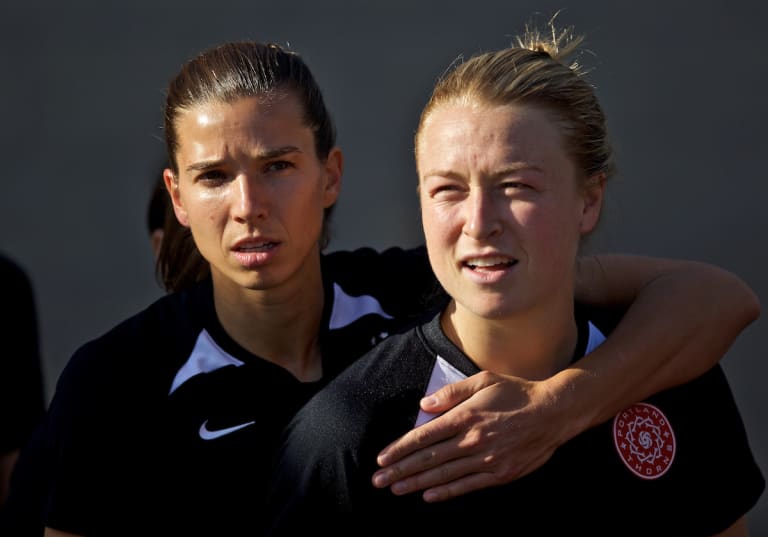
Image: Craig Mitchelldyer / Thorns FC
As she’s evolved from prospect to pro, from phenom to veteran, Heath’s been forced to strike new balances. Perhaps most obvious is her transition into that veteran’s role, with all the expectations that come with a tenured position.
“The first time that leadership actually was ever thrown at me was here with the Thorns. And it was when Mark (Parsons) became coach,” she remembers, about the lead in to the 2016 NWSL season. “I don't know if this was a deal maybe with (U.S. women’s national team head coach) Jill (Ellis), or maybe a way to get more out of me. But I remember when he told me, ‘I'm going to make you a captain.’ I was thinking, ‘Oh, there's so many other people that should be captain.’”
There’s an extra emphasis on “oh;” and extra emphasis on “so.” To her, the idea of being a team captain was, at the time, ridiculous.
“’It shouldn't be me,’” she persisted. “He was like, ‘I don't want you to change at all. I don't want you to be another way. I just want you to be the way you are.’ And I was like, ‘Okay, that's easy enough.’
“But I do think with that responsibility I grew a lot, and I did start taking more responsibility for the team, and for the outcome of the team and the performance of the team.”
Heath may have been as focused on responsibility before, but now, it comes out more. She talks about it. She has to. She’s a vice-captain of the Thorns, with the captaincy held by Sinclair, one of the game’s true icons. If she wasn’t going to take that title seriously, she might as well give it up.
“I'd never really seen myself as a leader or a leadership type,” she says, “and I don't know if it's because I'm more introverted or not as vocal. But if I was to be anything, I would want it to be someone that people could look at, whether it's in training or whether it's how I treat people, and say, ‘Oh, that's something that is awesome.’”
It’s here, in the place where soccer’s soft and hard skills meet, that Heath’s duality becomes a strength. In the face of new responsibilities, some players would crack, or maybe just over-think it. Some would actively turn away from the role, especially if they’d had success going about their career in a different way. Having vice-captain attached to your name is nice, especially if it doesn’t require any work. But when titles come with expectations, their fit becomes less certain.
“I’m so lucky, because expectations are so natural now,” she says. “From a young age, I've always played on every single team with an expectation to win. I don't know if that's what I'm attracted to or what is attracted to me. I don't know how that relationship works …
“Even playing here with the Thorns, I don't know how I ended up here, but it's a beautiful expectation that we have here, too: to win. And I love it. I enjoy it. And I wouldn't want any expectation, even if it was a tiny bit lower. I want the highest of expectations.”
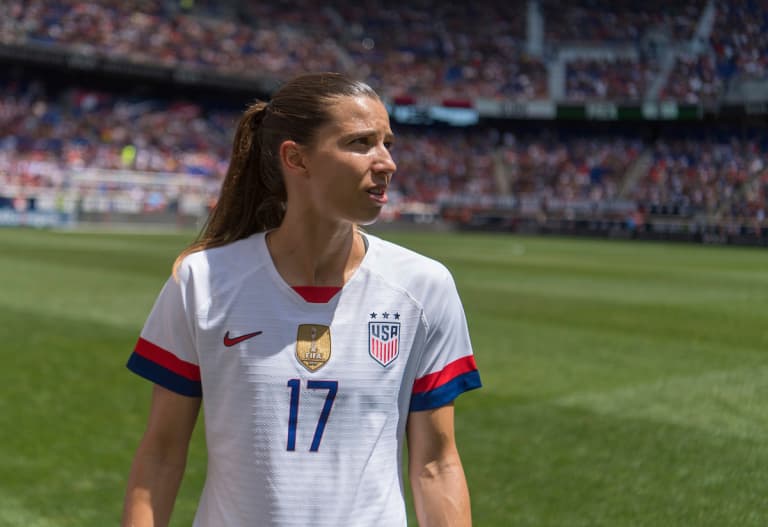
Image: ISI Photo
This summer, she’ll have those. Her team will have them, too. Going into the World Cup in France, the United States are seen as a favorite, albeit in a way there’s never been a favorite in a Women’s World Cup, before. Over the past three or four tournaments, the favorites have been the U.S. and Germany, with maybe another team, like the recent French squads, casting themselves as dark horses. This year, out of a pack of six or seven teams that can reasonably expect to make a run for the title, the U.S. is merely better equipped than most to claim the title.
That doesn’t mean it is going to happen. Heath knows as well as anybody. She’s won three major tournaments – the 2015 World Cup, as well as the 2008 and 2012 Olympics – but also experienced heartbreak in two others, losing in the final of Germany 2011 and being ousted in the quarterfinals of the 2016 Olympics in Rio de Janeiro.
“The moment can be so overwhelming in terms of just expectation and preparation,” she says, before tying those expectations into her world view. “For me, I just enjoy the process leading up to it. I know what's on the horizon, and I hope that it's something really, really special. But I'm focused on each day.”
The thought ties into the last pieces of philosophy Heath shares this day, one that’s unexpectedly outlined much of her Tao. We’re supposed to be talking NWSL season, and a little World Cup. Instead, we’re talking about, from one perspective, the picture of a perfectly balanced world.
“Perfection doesn't exist,” she retorts, though, when asked about the concept. “It's an illusion.”
At least, when it comes to a life in soccer, perfection is an illusion.
“What’s so beautiful about football is that it’s really, to me, an art. It's a precise art, at times, but it's a beautiful art. You never know what the game is going to give you, and you have to improvise with it. That’s what's so special about it.
“Then, in moments that you have to execute, it can be so precise. There’s that same duality in the game; where it has this freedom, but then it has a structure to it that's beautiful.”
Maybe, beyond her skills on the ball, there is something about Tobin Heath that is immutable. To her, she may still be the 10-year-old Tobin, but you don’t want to believe the person she is now, 13 years into the height of her career, was like this a 10 years old. You want to believe that she learned all this, evolved, the same way we did. She can’t be this eternal.
Has she really been like this all along, I can’t resist asking myself, especially when the topic turns to her art. To her, though, I have to put it in different words. “How is Tobin the artist different now than she was when she was 17, 18 years old?”
Here, the Philosophy of Tobin again comes out, its perspective and duality present in equal parts.
“You can't look forward, you can only look back on your career,” she says, “which is pretty special, now, because I have a bunch of cool things to look back on.”
